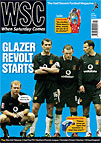 Losing your social club can be disastrous for a semi-pro side. John Bourn reports on a fire that cost Spennymoor dear and plunged the Unibond League into crisis
Losing your social club can be disastrous for a semi-pro side. John Bourn reports on a fire that cost Spennymoor dear and plunged the Unibond League into crisis
Whoever discarded a cigarette end behind a fruit machine at the Brewery Field social club on Christmas Eve 2003 has a lot to answer for. They began a chain of events that were to wreck a long-established north-east club and left the Unibond League in chaos this spring.
Brewery Field is – perhaps was – the home of Spennymoor United. The County Durham club have been playing there since 1904, latterly in the Unibond League. North-east sides have not had an easy time in the Unibond League in recent seasons, mainly due to their geographical isolation. Gateshead came close to extinction last summer, Blyth Spartans have had financial difficulties and Bishop Auckland are presently homeless (they shared at Brewery Field last season).
But until recently Spennymoor seemed one of the more stable outfits, with a tidy ground, decent crowds and income from a social club that was well placed for local housing. They even won promotion to the Premier Division in 2002-03. But early on Christmas Day in 2003, a serious fire gutted the building. Five fire appliances took two hours to control the blaze, which the police and fire investigators blamed on a discarded cigarette. Extraordinarily, the building was not insured. Only the shell of the clubhouse, covered in graffiti, remained a year later. The loss of the social club’s facilities was a severe financial blow and was probably a factor when, in January 2005, the club’s owner, colourful local businessman Benny Mottram, announced that he was going to stand down.
His decision followed a long-running row with the council. Mottram claimed the lease on the ground was illegal because a former member and clerk signed it; the council said the contract was held in escrow, which made it legal. Supporters not up on the fine print of property law were left scratching their heads. For their part, the council stated that they had put £200,000 of grants, sponsorship and loans into the club, and charged a nominal rent of £20 a week.
As the club’s problems mounted, crowds dwindled from three figures to two. An altercation between Mottram and some supporters during a defeat by Bamber Bridge in February saw the owner storm out of the ground, only pausing to pop his head into the dugout to advise manager Graeme Clark of his early exit. Within a month, Clark had gone, too, resigning after a 5-1 Good Friday defeat at Gateshead.
That defeat was one of Spennymoor’s final games. They were already in trouble for failing to fulfil fixtures, with Mottram blaming one non-appearance (for a Sunday clash at Witton Albion) on the religious convictions of two of his players. The Moors were left in the impossible situation of having to play ten games in 23 days with a wafer-thin squad.
By mid-April, it was clear that Spennymoor would be unable to complete the season. This left the Unibond League in a quandary and they eventually decided to expunge Spennymoor from the season’s records and annul all points won by teams against them.
This was hard luck indeed on Workington Town, who lost six points and thus missed out on being league champions. In the revised table, the title would have gone to Farsley Celtic. Not surprisingly, Workington appealed.
A further complication arose from the fact that the meeting that took the contentious decision was not quorate. The Unibond League were left in the embarrassing position of having to postpone the semi-finals of the Premier Division play-offs, which would decide promotion to Conference North, and having to publish two different league tables – one with Spennymoor United’s record included and one with it expunged – until a further meeting could be held.
When the fresh meeting took place, it reached the same conclusion. A further appeal to the Football Association followed and it was finally decreed that Spennymoor’s unplayed matches would be treated as 0-0 draws but with all three points going to their opponents. This meant that the league had still another set of champions – Hyde United. Farsley Celtic and Burscough (who missed out to Prescot Cables on the play-offs in the final version of the league table) made a joint legal attempt by to overturn the ruling, but were unsuccessful.
For Workington at least, there was a happy ending. While not promoted as champions, they made it safely through the play-offs, eventually beating Farsley 6‑5 on penalties. Another happy club were Rossendale United, reprieved from relegation from the Unibond First Division.
And what of Spennymoor? They were formally expelled from the Unibond League on May 24, but a few days later it was announced that Northern League Second Division strugglers Evenwood Town are to relocate to Spennymoor and rename themselves AFC Spennymoor United. The move brings to an end 70 years of football at Evenwood’s scenic Welfare Ground, which has been beset by vandalism. But for Spennymoor it means they can start again, back in the league they left in 1990.
From WSC 221 July 2005. What was happening this month